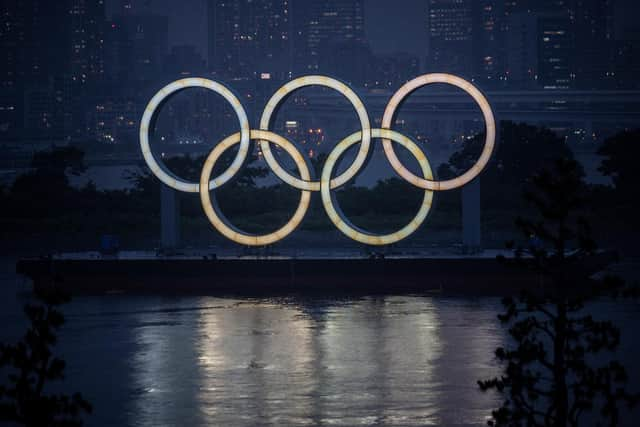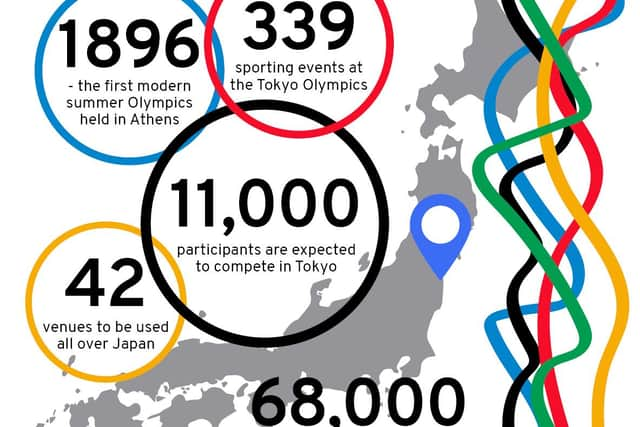When does the Olympics start? Dates of Tokyo 2020 Olympic Games, 2021 schedule and UK time difference explained
and live on Freeview channel 276
The final countdown to the Tokyo Olympics is on after officials confirmed the Games will "100%" be happening this summer.The news comes as a welcome boost to athletes and broadcasters after the Covid pandemic led to the initial postponement of Tokyo 2020 lastyear.However, there have now been positive cases of Coronavirus confirmed among competing athletes, following concerns raised over the impact of hosting the games during the pandemic. Here's when the Olympics will start in 2021, what the current Covid situation is in Tokyo and why the Japanese public has its concerns.
When do the Tokyo Olympics start?


The Tokyo Olympics will be held from Friday 23 July to Sunday 8 August 2021.
Advertisement
Hide AdAdvertisement
Hide AdThe Games' opening ceremony will take place at the country's Olympic Stadium from 8pm local time (JST) on 23 July.
Japan Standard Time (JST) is eight hours ahead of British Summer Time (BST), meaning the ceremony will begin from 12noon for UK viewers.
The closing ceremony, which signals the end to the Games, will take place from 8pm JST (12noon BST) on 8 August at the same venue.


What is the Tokyo Olympics schedule?
Organisers had to rethink their initial plans due to the Games being pushed back 12 months due to the Covid pandemic.
Advertisement
Hide AdAdvertisement
Hide AdIt meant the original schedule, from 24 July to 9 August 2020, was ripped up in March just months before the Games was due to take place.
Despite the postponement - a first in the history of the Games - the event has maintained the Tokyo 2020 name for branding purposes.
The Tokyo Olympics will feature a record number of 33 competitions and 339 events held across 42 competition venues
Which sports will debut at the Tokyo Olympics?
Under new IOC (International Olympic Committee) rules, the host nation can add new sports to the event's programme.
Advertisement
Hide AdAdvertisement
Hide AdThis is in addition to the core events synonymous with the Olympics.
The Tokyo Olympics will see freestyle BMX, three-on-three basketball, karate, surfing and skateboarding all make their Games debut.
Athletes will compete in baseball and softball sporting events at the Olympics for the first time since Beijing 2008.
What is the Covid situation in Japan?
With less than a month until the start of the Tokyo Olympics, Japan is still dealing with a fourth wave of Covid cases.
Advertisement
Hide AdAdvertisement
Hide AdNo fewer than 10 areas of the country - including Tokyo - are under a state of emergency until 22 August, but the Games will "100%" go ahead.
Despite Seiko Hashimoto, Tokyo 2020 president, promoting an "even more safe and secure Games”, there have now been two confirmed cases of Covid among the athletes already living in the Olympic village.
On 18 July, it was reported that the two athletes are from the same country and same sport, their team mates are now self-isolating.
There have also been 10 other confirmed cases among personnel linked to the games, from journalists to contractors and staff.
Advertisement
Hide AdAdvertisement
Hide AdThe games are still set to go ahead, however the Japanese public are against hosting the games, according to the country's economicsnewspaper Nikkei.
Why is the Japanese public against holding the Olympics?
The current state of emergencies in 10 areas of Japan, including Tokyo, is enough of a sign that the country is still grappling with Covid.
Although the number of infections are generally trending downwards, the arrival of 90,000 athletes, officials, journalists and support staff is a concern.
This is largely based on three factors: keeping the number of hospitalisations and deaths to a minimum, avoidance of more transmissible variants, and its cautious vaccine rollout.
Fractionally more than 12% of Japan’s overall population have been fully vaccinated for Covid – around 15 million people vaccinated in a country with a population of 126 million.
Comment Guidelines
National World encourages reader discussion on our stories. User feedback, insights and back-and-forth exchanges add a rich layer of context to reporting. Please review our Community Guidelines before commenting.
